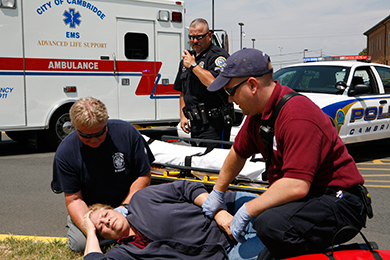National EMS Week Honors Lifesaving Work of Medicine’s “Front Line”
MPC’s professional education and clinical coordinator Lisa Booze, PharmD, CSPI, explains how the center partners with EMS providers to improve patients’ health.
By: Malissa Carroll
Wednesday, May 21, 2014

Established by President Gerald Ford in 1974, National Emergency Medical Services (EMS) Week, celebrated this year May 18-24, brings together local communities and health care providers to raise awareness about safety and recognize the dedication of the members of medicine’s “front line” who provide lifesaving service to patients every day.
“The Maryland Poison Center (MPC) thanks our partners in the emergency medical services field for their dedication to providing care to poison and overdose patients, as well as for their work in the community to help prevent poisonings,” says Lisa Booze, PharmD, CSPI, professional education and clinical coordinator for the MPC. “MPC staff members are proud to serve as a valuable resource for EMS providers, working with them to optimize treatment for patients with suspected poisonings and overdoses.”
Housed within the Department of Pharmacy Practice and Science at the University of Maryland School of Pharmacy, the MPC is staffed by pharmacists and nurses who are nationally certified as specialists in poison information. These specially trained health care professionals can provide first responders with information about:
- Assessment of poisonings, overdoses, and envenomations
- Range of toxicity (toxic dose information)
- Overdose and poisoning signs and symptoms
- Toxidrome identification
- Specific treatment recommendations for each patient
- Decontamination recommendations
- Assistance locating antidotes and anti-venom
- Drug interactions
- Pill identification
- Identification of chemicals that may be hazardous to first responders
- Access to public health emergency information
In addition, a call to the MPC can help first responders determine whether a patient needs to be transported to a local hospital. “In many cases, a call to the poison center can avoid a trip to the hospital. Approximately 66 percent of all calls received by the MPC are successfully managed outside of a health care facility,” adds Booze.
For situations in which patients must be transported to the hospital, MPC staff can work with first responders to provide individualized treatment advice for each patient and follow the patient through his or her hospital stay, where they will continue to make treatment recommendations and record outcomes.
“Staff at the MPC are available to answer calls 24 hours a day, seven days a week,” says Booze. “We handle approximately 57,000 calls each year, and the Maryland Institute for Emergency Medical Services Systems encourages EMS providers to consult with us in conjunction with other health care professionals to help determine the best treatment for any individual with a suspected poisoning or overdose.”
The MPC is also actively involved in the training of EMS providers through classes, drills, continuing education presentations, and on-site training. It also publishes a monthly e-newsletter for health care professionals, titled ToxTidbits, and makes available a wide range of educational materials, including pamphlets, telephone stickers, magnets, and posters for EMS providers who participate in outreach events at local schools, health fairs, open houses, and safety days.
However, it is not only EMS providers who benefit from their interactions with the MPC.
By discussing suspected poisonings with trained professionals at the MPC, EMS providers can help the poison center identify important public health threats, such as terrorism and food poisoning. The information received from each call can also be used to help staff members determine the effectiveness of treatments and identify where public education efforts are needed. “EMS providers are vital to the MPC’s effort to help the public,” says Booze.
For more information about the services available to EMS providers through the MPC, please contact Lisa Booze at (410) 563-5583 or lbooze@rx.umaryland.edu.